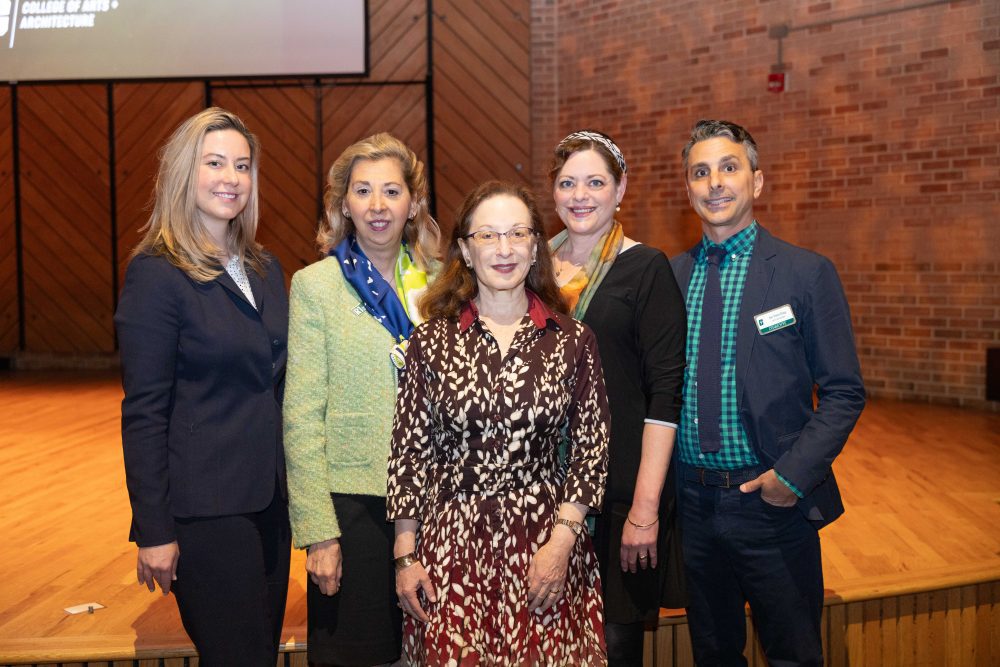Exploring Creativity in the Age of AI: A Conversation with Head of U.S. Copyright Office at UNC Charlotte
What does it mean to be a human creator in a world where artificial intelligence is increasingly embedded in the creative process? This question took center stage on April 2, 2025, when UNC Charlotte’s Division of Research Office of Commercialization and Partnerships, in collaboration with the College of Arts + Architecture hosted, “AI & Copyright – The Future of Creativity.”
The morning began with a welcome from Dr. Deborah Thomas, associate vice chancellor for research, who underscored the significance of the event for the UNC Charlotte community.

Dr. Thomas emphasized the interdisciplinary nature of the conversation, noting that AI’s rapid integration into everyday life affects every field—from the arts to computer science and engineering. She encouraged the audience to engage deeply with the discussion, emphasizing the rare opportunity to gain insights from two leading figures in copyright, trademark, and intellectual property policy—Shira Perlmutter and Laura Peter. “Their perspectives on the fast-paced evolution of AI and its implications for creativity and policy are invaluable,” Dr. Thomas shared, setting the stage for a robust dialogue.
Fireside Chat: Shira Perlmutter on AI and Copyright

Following Dr. Thomas’ remarks, the event progressed to a Fireside Chat between Shira Perlmutter, register of copyrights and director of the U.S. Copyright Office, and Laura Peter, executive director of UNC Charlotte’s Office of Research Commercialization and Partnerships.
Perlmutter, recognized nationally as a leader in copyright law and former chief policy officer at the USPTO, offered an insider’s view on the U.S. Copyright Office’s ongoing work to clarify authorship standards in the era of generative AI.
In conversation with Peter, whose own career bridges innovation, law, and policy, the two explored the U.S. Copyright Office’s recently released report, “Copyright and Artificial Intelligence, Part 2: Copyrightability” (January 2025), which affirms that copyright protection depends on whether a human has contributed “sufficient expressive elements,” and that a prompt to an artificial intelligence engine, no matter how elaborate, is not enough.
“The centrality of human creativity remains the foundation of copyright protection,” Perlmutter explained. She referenced the U.S. Copyright Office Review Board’s decision on Jason M. Allen’s “Théâtre D’opéra Spatial”, noting that the AI-generated content was ineligible for copyright due to insufficient human involvement. She emphasized that while AI tools may be used in the creative process, it is the human author’s distinct contributions, including creative choices, modifications, and curation, that determine copyright eligibility. She also shared that existing law is sufficiently adaptable to accommodate AI without the need for new legislation.
Peter guided the conversation toward practical implications, asking how professionals in artistic and creative industries—artists, architects, developers—can navigate this legal gray area. Perlmutter stressed the importance of transparency and documentation, advising creators to clearly articulate their human input when registering works. Their dialogue explored not only the boundaries of authorship and fair use but also the broader implications for innovation, ownership, and accountability in an AI-powered world.
Panel Discussion: Diverse Faculty Perspectives on AI’s Impact
The conversation continued with a panel discussion moderated by Arnetta Girardeau, J.D., copyright advisor at UNC Charlotte’s Atkins Library. The panel brought together interdisciplinary voices from across campus to discuss how AI is transforming their respective fields:
- Dr. Gordon Hull, professor of philosophy, highlighted intersections between law, philosophy, and technology. He drew historical parallels to cases like the VCR to illustrate how copyright law evolves and urged a policy approach that balances innovation with protection.
- Dr. Sabri Gökmen, assistant professor of architecture, explored how AI democratizes access to information and fosters creativity by making once-inaccessible data widely available. He emphasized AI’s potential in advancing pedagogy and design exploration.
- Dr. Heather Freeman, professor of art in digital media and acting director of Charlotte Night Owl Interactive, reflected on how every technological shift—now amplified by AI—has historically required creators to adapt. She emphasized the need for new strategies in teaching and research.
- Dr. Kyoung Hee Kim, professor of architecture and director of the Integrated Design Research Lab, shared how AI can enhance visualization and integrate emerging building technologies. She also stressed the importance of human oversight to ensure the integrity of creative visions.
- Dr. Srijan Das, assistant professor of computer science, raised ethical concerns around AI models, particularly in video representation learning and computer vision. He highlighted issues of accountability and liability, especially when models use third-party data, and called for stronger ethical frameworks.
The panel was joined by Miriam Lord, associate register of copyrights and director of public information and education at the U.S. Copyright Office. She posed to the group: “What do we have at stake, and what does this mean for us all?” Lord emphasized that copyright law is inherently flexible and encouraged the panelists to consider how their fields must evolve in response to AI. “The Copyright Office is listening,” she assured the audience, “and open dialogue with creators is essential.”
Looking Ahead
The event fostered a rich dialogue, leaving attendees with a deeper understanding of the challenges and opportunities at the intersection of AI and Copyright. Dr. Thomas’s opening remarks reinforced UNC Charlotte’s commitment to interdisciplinary collaboration, positioning the university as a hub for addressing the societal impacts of AI.
The Division of Research invites the community to continue engaging in these topics through future events and partnerships. As AI continues to redefine creative expression, UNC Charlotte remains dedicated to advancing education, innovation, and societal impact.